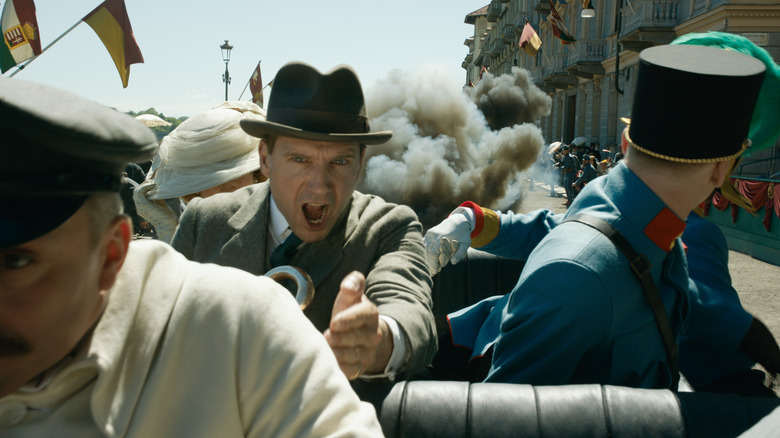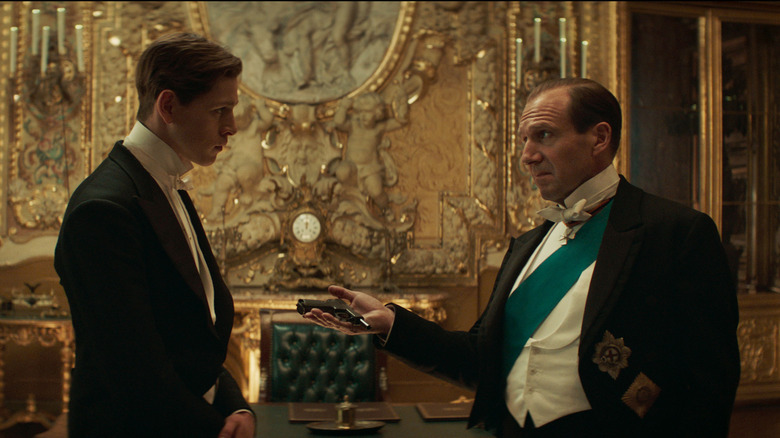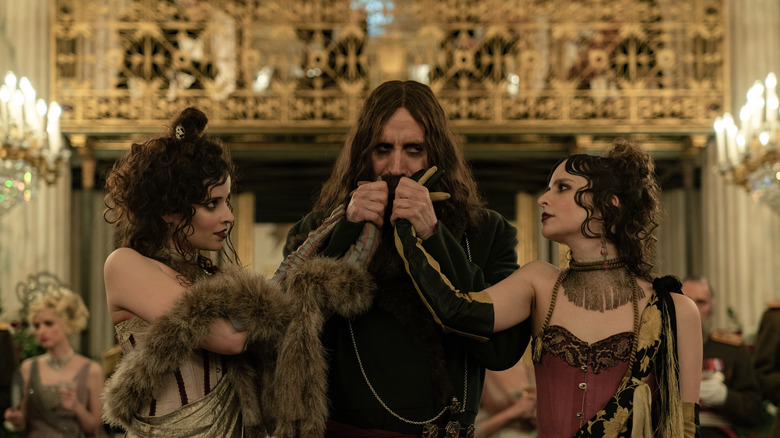The King's Man Review: The Kingsman Prequel Maketh For A Brutal And Bizarre War Movie
The "Kingsman" series is perhaps our weirdest ongoing popular franchise. Matthew Vaughn's sleek adaptations of the obscenely violent Mark Millar comics turned a misanthropic send-up of the gentleman spy thriller into star-studded entertainment whose flashy action sequences made you overlook how secretly conservative it is. (The Big Bad villains of the first movie were environmentalists!)
So what happens when you take the "spy" part out of the spy movie, in a prequel story that chronicles the creation of this super secret spy service that operates out of a posh tailor shop? Something that's a cross between a somber war movie and a "Downton Abbey"-inspired soap, while maintaining the cartoonishly violent and sneakily nasty elements of the first two "Kingsman" films. "The King's Man" is a tonally off-kilter action flick that gets graver and more solemn than its two predecessors, but its self-serious riff on the World War I film makes it harder for Vaughn to hide its deeply troubling plot.
A War of Tones
A decade before the Great War breaks out, Ralph Fiennes' Lord Orlando Oxford and his wife (Alexandra Maria Lara) and adolescent son Conrad are delivering Red Cross supplies to a British Army camp in South Africa at the height of the Second Boer War. Fighting breaks out and Orlando's wife is fatally shot, pleading with Orlando to prevent Conrad from ever seeing war again before dying in his arms. But as Conrad (a suitably noble-browed and naïve Harris Dickinson) grows into a young man, war is hard to avoid: it's 1914 and tenuous international alliances mean that conflict is on the horizon. Orlando is called out of his semi-retirement by his former commanding officer Herbert Kitchener (Charles Dance, playing the first of the film's many real-life historical figures) to escort the Archduke Franz Ferdinand of Austria on his visit to Sarajevo. (Yes, we're going there.) Both Orlando and Conrad are on hand to stop a first assassination attempt on Ferdinand, but fail to stop the shot that starts the Great War, which plunges the world into the worst international conflict it had ever seen.
"The King's Man" then Forrest Gumps its way through early 20th century history, but without any of the well-intentioned sentimentality of that Robert Zemeckis drama. This is a World War I movie as an edgy comic book: playing out as a straightforward war drama at times, only to break out into those "Kingsman"-style excesses of hyperviolence. But "The King's Man" loses the tongue-in-cheek satire of the first two films — whose veneer of satire was already thin to begin with — making its moments of outrageous comedy all the weirder. How can a movie that adopts the grim tone of a World War I movie also feature a scene where Rhys Ifans' hedonistic Rasputin licks Ralph Fiennes' leg then twirls around with a knife like some kind of deranged supervillain? "The King's Man" does, but whether it does that well is another question.
Vaughn does have a knack for pulling off dazzling action sequences, and the added griminess of World War I gives him a chance to display his saturated comic-book hyperviolence in a new and exciting way. Gemma Arterton and Djimon Hounsou in particular shine during these sequences, joining Fiennes and Dickinson's father and son in one rushed mission that goes hilariously wrong. Fiennes makes for a thrilling and unusual kind of hero, weighed down by past traumas and his own age, which makes it all the more exciting to see him at the center of such high-octane action scenes. But as stylish as Vaughn's direction continues to be, it can't make up for the film's disjointed and overlong narrative.
I Spy a Conspiracy
Unlike what the marketing would have you believe, "The King's Man" isn't a spy movie. At least, not the "James Bond in the Edwardian era" spy movie that it has been presented as. And in a way, that is for the benefit of "The King's Man," which proves to have a certain charm in the way its characters stumble through massive historical events, conspiracies, and even personal dynamics beyond their control. Fiennes' Orlando Oxford is an overly protective father to Conrad, shielding him from the horrors of the world within their palatial mansion, all the while training him to be an impeccable fighter, for some reason. So when Conrad insists on enlisting in the Army to fight in the Great War, Orlando refuses, blocking Conrad's every attempt to join the war. This of course doesn't stop Conrad who, with the help of an oblivious soldier played by Aaron Taylor-Johnson (reuniting with his "Kick-Ass" director in a shockingly minor role), tricks his way to the front lines.
The plot meanders as "The King's Man" suddenly transforms into a "1917" redux, even recreating that film's famous battlefield run, and deals with its war scenes with such heft that I wondered if the "Kingsman" franchise was turning a new page and growing up. Reader, it wasn't.
While the father-son conflict between Orlando and Conrad — exacerbated and made all the more tragic by a great war coming in between them — is genuinely heartfelt and probably the best part of this messy film, "The King's Man" can't shake the gross immaturity and sneakily conservative messaging of the franchise.
Without giving too much away, "The King's Man" is an imperialist nightmare, a film that nostalgically advocates for the "stability" of monarchy and the time of powerful empires. The way it weaves in real-life historical figures and tragedies, and offers up a conspiratorial answer to them, is the stuff of a 4chan thread's dreams. As charismatic as its stars are, and as refreshing as its period setting is, the wildly inconsistent tone and overstuffed runtime loses whatever was left of the shine of the first "Kingsman."
/Film Rating: 5 out of 10


